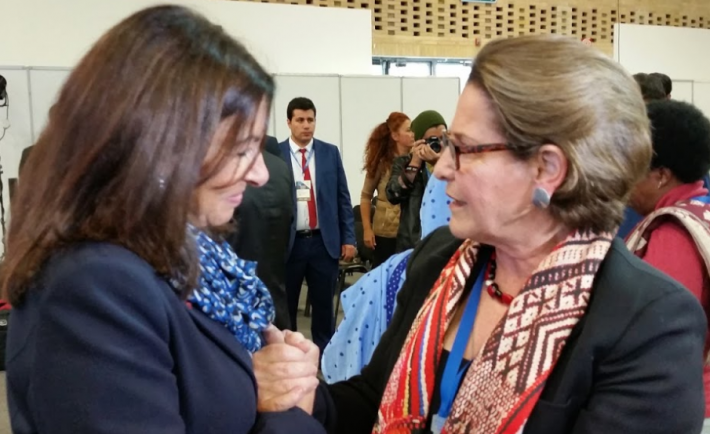
Susana Villarán (right) speaks with Anne Hidalgo, mayor of Paris, at the United Cities and Local Governments World Summit, in Bogota (October 2016).
"The world is not built or transformed without half of humanity, and because it is so difficult for us as women to achieve power and at the highest level in our cities, our commitment is to transform them," said Anne Hidalgo, mayor of Paris.
The scene where these words were heard was the city of Bogotá, where the United Cities and Local Government World Summit was held. This meeting, as well as Habitat III in Quito, both in October 2016, witnessed the vibrant participation of a significant number of women leaders, at the highest level from all regions of the world. Representatives came from a range of organized networks including women’s social movements, women mayors, technocrats from international organizations, girls and older women, indigenous women, and women with disabilities. National Democratic Institute (NDI) convened our delegation of mayors and social leaders from two of these networks.
The common objective, within the diversity that enriches the global women's movement, was to radically deepen the gender perspective and the policies in favor of the rights of women living in cities embodied in the 175 articles of the New Urban Agenda (NUA) approved in Quito by the member states of the United Nations.
After reviewing the work of those intense ten days, I synthesized into two parts the challenges with which we left Quito. These challenges need to be addressed if we are to achieve the full enjoyment of our rights, the promotion of gender equality and the wellbeing of human beings on a planet that, in a few years, will house 75 percent of the world's population in cities.
The first of the challenges is to guarantee a process of urbanization and the redesign of existing cities, which enables our full physical, economic, social and cultural autonomy. The second, is to reach women's full access to the highest levels of political decision-making in the cities of the world.
In relation to the first challenge, the data we have (and this is the first obstacle, the continued lack of disaggregated data,) indicates deep gaps in the opportunities for women in cities: in the use of time for the roles we assume, access to education, health, water, decent housing, decent work, safe transport, security and a life free of violence in public and private spheres. Therefore, there is a need for urban planning with gender mainstreaming: the equitable distribution of budgets with a tracking system of specific indicators designed to measure the effective investment in measures to promote gender equality and women’s empowerment, and the periodic measurement of progress and setbacks that will allow the precise identification of obstacles and opportunities.
But while economic investment is necessary, it is not the only thing needed to achieve change in discriminatory patriarchal norms: we must also develop a powerful education policy using all available technology and working with families and grassroots communities.
With regard to access to power, the challenges are even greater. UN Women convened 500 mayors and local authorities in 2013, noting that only 5 percent of mayors in the 194 world countries are women. The figure may have changed a bit today but not much. In most of the urban areas of the planet, women are in positions at the base of the local government pyramid of power. The higher you climb, the fewer women there are.
While it is true that being women in power does not guarantee "per se" that the agenda of women's rights and gender equality becomes public policy, fighting for parity is the right thing to do. Research tells us that women in politics change the institutions of government and the nature of authority, and that it is less difficult to achieve consensus - even among political opponents - on a women’s rights agenda.
Our aspiration is to achieve political parity and the power to transform, to use authority in the best interest of our constituents, and to inaugurate a different way of governing. That is what we aspire to. We must use all our creativity to share and disseminate these new models of leadership among women leaders. This is a great assignment for NDI which has a mission to support the transformation of societies towards democracy, justice, freedoms, equal rights, and the sustainable management of the earth’s resources.
In this age of uncertainties and rapid changes, we are witnesses to the fact that although their numbers are few, women have the potential to lead differently. In changing politics around the world, women can increase equality and opportunity, and transform our cities into welcoming spaces that care and protect all their citizens, promote the autonomy of women and the well-being of humanity.
